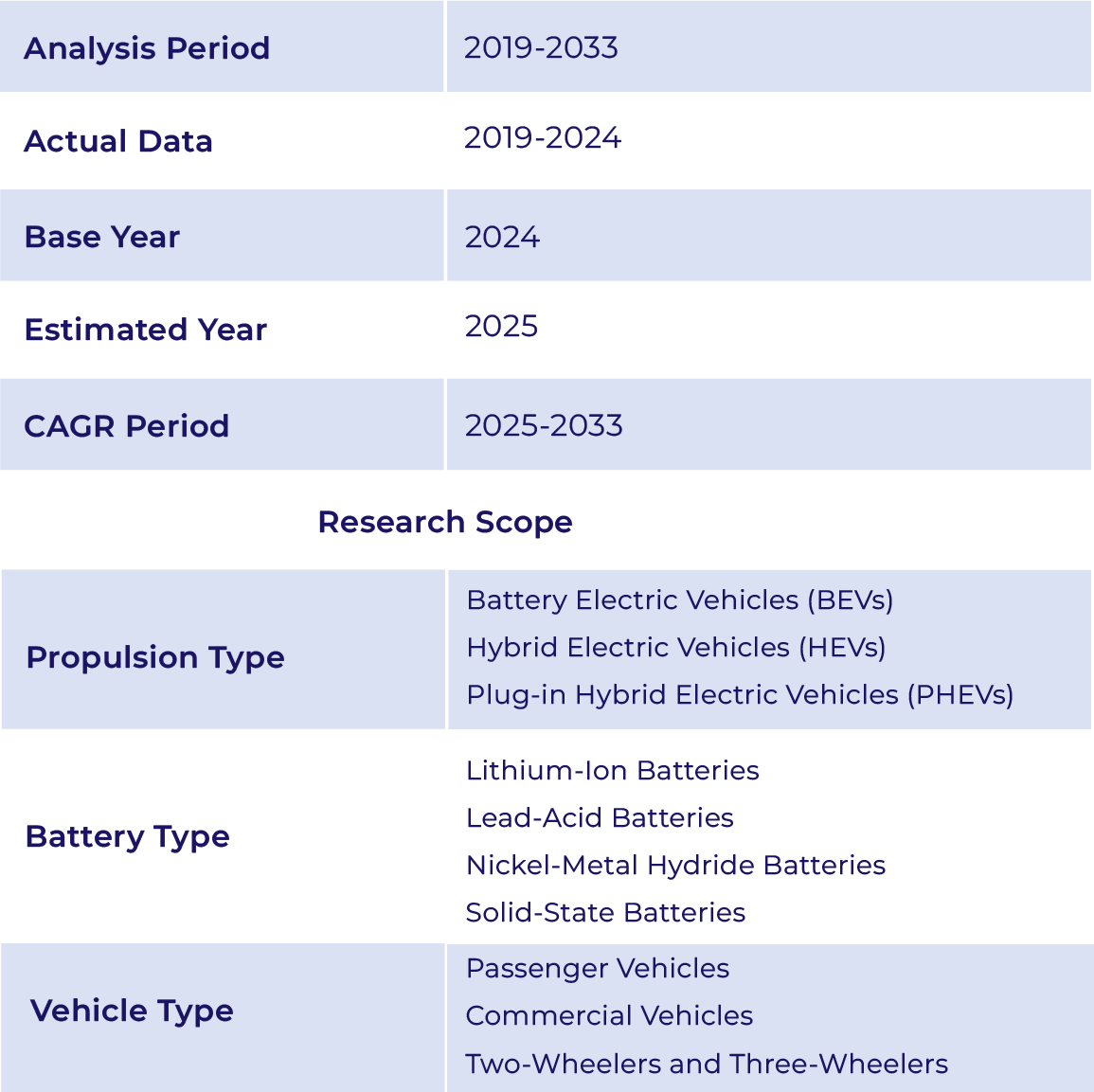Taiwan Electric Vehicle Battery Market Growth and Performance
- The electric vehicle (EV) battery market in the Taiwan expanded by XX% in 2024, reaching a total market value of US$ XX million, fuelled by increasing consumer demand.
- Forecasts indicate the market will grow at a compound annual growth rate (CAGR) of XX% through 2033, potentially reaching US$ XX million in valuation.
Taiwan Electric Vehicle Battery Market Outlook
EV battery market in Taiwan is poised for strategic global influence, as demonstrated by its latest international collaborations. In April 2024, Solidion Technology partnered with Taiwan-based Giga Solar Materials Corp. to develop next-generation lithium-ion battery technologies for the U.S. market. This alliance marks Taiwan’s ambition to extend its EV battery footprint beyond Asia by leveraging its mature electronics and energy material sectors. Giga Solar, known for its photovoltaic materials, is now entering the EV battery segment, enhancing Taiwan’s position as an innovation hub. The partnership will focus on enhancing battery efficiency, longevity, and integration with energy storage systems—crucial to addressing growing global demand for electric mobility. These developments reflect Taiwan's push to move up the EV value chain and become a critical exporter of battery materials and technologies. As global markets shift toward clean energy, Taiwan's proactive approach is expected to drive significant market growth and international partnerships.
Taiwan Electric Vehicle Battery Market Drivers
A major driver for Taiwan's EV battery market is its expanding global influence through corporate alliances. In January 2022, Taiwanese battery manufacturer ProLogium signed a strategic investment deal with Mercedes-Benz, targeting the co-development of solid-state battery technology. These batteries are lighter, safer, and offer higher energy density than traditional lithium-ion alternatives. This partnership aligns with Taiwan's broader industrial policy to specialize in advanced materials and clean energy technologies. ProLogium's innovation not only provides Mercedes-Benz with a competitive edge but also reinforces Taiwan’s capability to produce high-performance batteries for global automakers. The collaboration signals trust in Taiwan’s battery R&D capabilities, pushing the country toward becoming a central player in the EV battery supply chain. Such deals are crucial for the island’s economic resilience and help drive investment in local manufacturing ecosystems. Moreover, this driver is fueled by the surging global demand for longer-range, faster-charging EVs, where solid-state batteries could become a game-changer.
Taiwan Electric Vehicle Battery Industry Trends
A defining trend in Taiwan’s EV battery industry is its rising role in international EV infrastructure collaborations. In January 2023, the state of Maharashtra, India, entered a landmark $2.5 billion partnership with Taiwan’s Gogoro Inc. and Belrise Industries Ltd. to establish an extensive EV battery-swapping network. This project spans across urban and rural areas and aims to build thousands of battery-swapping stations—strengthening Gogoro's smart battery-sharing ecosystem. The deal illustrates how Taiwanese technology is being exported as a solution to EV infrastructure gaps in emerging markets. Gogoro’s scalable battery-swapping model has already proven successful in Taiwan, and its replication in India signifies a broader industry trend toward modular and shared energy solutions. Taiwan's EV battery sector is thus transitioning from product manufacturing to energy-as-a-service platforms, reflecting global trends toward smart mobility. This aligns with Taiwan’s policy goals of supporting green technology exports and creating international revenue streams beyond hardware manufacturing.
Taiwan Electric Vehicle Battery Industry Development
Taiwan's local battery manufacturing capabilities continue to grow, highlighted by domestic investments in plant infrastructure. In May 2024, Ahamani EV Technology, a Taiwanese EV manufacturer, announced plans to set up a lithium-ion battery production facility in India. This expansion reflects a broader strategy to tap into the fast-growing South Asian market and diversify manufacturing hubs to support global demand. The plant will focus on producing battery packs for electric two-wheelers and commercial vehicles—segments where Ahamani has seen strong traction. While the manufacturing plant will be located in India, the R&D, core technology, and design will remain rooted in Taiwan. This development supports Taiwan's strategy of scaling production while maintaining innovation leadership at home. Ahamani’s expansion mirrors a growing trend among Taiwanese firms to integrate upstream material control with downstream product development, creating a vertically aligned battery ecosystem. These moves solidify Taiwan's relevance not only as a supplier but also as a thought leader in EV battery solutions and market adaptability.
Taiwan Electric Vehicle Battery Market Scope







